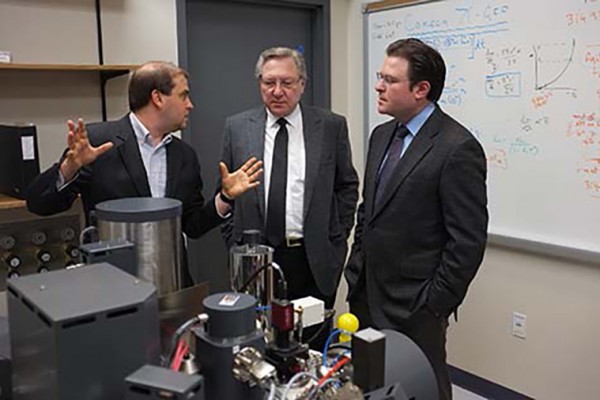SIMS laboratory dedicated
Last week, the university dedicated the Grossman Family SIMS Laboratory in Rudolph Hall. The build-out of the lab was funded by a gift from the family of WUSTL alumnus Matthew Grossman. The space houses a state-of-the-art secondary-ion mass spectrometer that will be used primarily for the analysis of geological samples but also will be available to members of the newly founded Institute of Materials Science and Engineering to study problems in the analysis and design of materials.
Intrinsically disordered proteins: A conversation with Rohit Pappu
For 100 years, the dogma has been that amino-acid sequences determine protein folding and that the
folded structure determines the protein’s function. But
as a Washington University in St. Louis engineer explains in the Sept. 20 issue of Science, a
large class of proteins doesn’t adhere to the structure-function paradigm.
Called intrinsically disordered proteins, these proteins fail fold either in
whole or in part and yet they are functional.
$125 million U.S.-India Initiative for Clean Energy drives expansion of WUSTL’s solar energy program
Engineers at Washington University in St. Louis will be working on low-cost solar cells and systems that integrate solar cells with batteries as part of $125 million U.S.-India Initiative for Clean Energy announced this year. The technology is designed to help India leapfrog energy technologies, moving directly to low-emission electricity generation and bypassing as much as possible fossil-fuel electrical generation.
Scientists read monkeys’ inner thoughts
Scientists at Washington University in St. Louis who were decoding the activity of populations of neurons in the motor cortex discovered that they could tell how a monkey was planning to approach a reaching task. By chance the two monkeys
chosen for the study had completely different cognitive styles. One was a hyperactive type, who kept jumping the gun, and
the other was a smooth operator, who waited for the entire setup to be
revealed before planning his next move. The difference is clearly
visible in their decoded brain activity, allowing the scientists, in effect, to read their minds.
$2 million to study role-switching cells in heart failure
The National Institutes of Health has awarded more than
$2 million to a team of scientists from Washington University in St.
Louis and InvivoSciences, a biotechnology startup with WUSTL roots, to
construct artificial tissue models that will allow the rapid testing of
new drugs for heart failure.

